Archive for March, 2007
Malaysia-US FTA – Questions for Rafidah
Posted by Kit in Economics, Parliament on Saturday, 24 March 2007
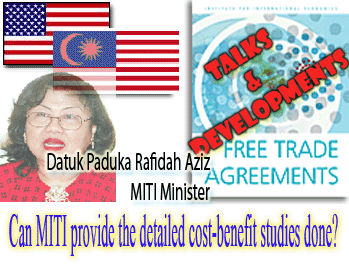
On Tuesday, Minister for International Trade and Industry, Datuk Paduka Rafidah Aziz, gave a 21-page reply to questions on the Malaysia-US FTA talks and developments.
Rafidah said that the sovereign right of the government to make and implement certain national policies for the interests of the rakyat and country is one of the fundamental issues that are non-negotiable for Malaysia in any bilateral FTA.
Malaysian sovereignty
I want to raise 3 matters of vital public importance that are on the negotiation list.
First is the issue of the mandatory labelling of genetically modified organisms (GMOs) and products containing GMOs. The Biosafety Bill that has passed the first reading in this House is necessary to safeguard public health and the environment. An important provision is the one that requires mandatory labelling, and we understand that Draft regulations for labelling of genetically modified food are ready and notified to the WTO. For consumers who may have allergenic reactions to certain GM products or have religious reasons to reject such products labelling is essential.
I raise this because the US Trade Promotion Authority (TPA) Act expressly states that labelling of biotechnology products is a practice that should be eliminated as it decreases US export opportunities when consumers choose not to consume GM food.
The US Biotechnology Industry Organization (BIO) and the AMCHAM Malaysia/US Chamber of Commerce have opposed mandatory labelling of genetically modified products or foods in their public submissions to the US Trade Representative. In particular, AMCHAM Malaysia/US Chamber of Commerce state that such labelling “should be firmly opposed by the U.S. in the FTA Negotiations”.
Many countries (such as Japan, China and many European countries, and even Australia which signed an FTA with the US) already require mandatory labelling. This is consistent with the WTO Agreement on Technical Barriers to Trade which states that “technical regulations shall not be more trade-restrictive than necessary to fulfil a legitimate objective”.
The legitimate objectives include “national security requirements,
prevention of deceptive practices, protection of human health or safety, animal or plant life or health, or the environment” (emphasis added). The prevention of deceptive practices includes product information and labelling, so it is clearly within our sovereign right to have mandatory labelling of GMOs and GM products.
Under the Codex Alimentarius Commission, the joint WHO/FAO body regulating international food standards, the Committee on Food Labelling has been discussing a global standard for mandatory GM food labelling. The draft standard on GM labelling has support from a majority of the Committee, including Malaysia.
Is this one of the areas of national sovereignty that will be non-negotiable?
Read the rest of this entry »
Why still no Chief Judge of Malaya after 2 1/2 months?
Posted by Kit in Court, Parliament on Friday, 23 March 2007

Fourthly, on an independent judiciary — Malaysia was held in high international esteem until the 1988 judicial crisis, and the nation has not fully recovered from the trauma and fall-outs of the successive series of judicial crisis for the ensuing 15 years. How to restore full public confidence in the system of justice in the country?
The answer by the Minister in the Prime Minister’s Department, Datuk Nazri Aziz to Karpal Singh (DAP-Bukit Glugor) yesterday that the government has no plans to set up a Judicial Commission for the appointment of judges is most deplorable.
What is even more shocking is that this is also the view of the Chief Justice, Tun Ahmad Fairuz Sheikh Abdul Halim who had likened the proposal for an independent judicial commission on appointment and promotion of judges as akin to nudity rather than transparency. Such comment by the higher judicial officer in the land is most ill-advised, in poor taste and reflect badly on the office of Chief Justice.
Ahmad Fairuz may be unhappy with the proposal of an independent judicial commission to oversee the selection and promotion of judges, but he should realize that this proposal pre-dates his appointment to the top judicial post in the land and meant to enhance public confidence in the system of justice and in that context, there is nothing personal against any personal holder of the office.
Ahmad Fairuz should not have questioned the motives of those who had made the proposal, such as the Bar Council and several prominent lawyers, posing the rhetorical question: “Are we to allow whoever has cases in court and who lost to decide on the fate of judges?” He ignores the support of retired judges for the proposal.
It is absolutely wrong and inapt to categorise the proposal of an independent Judicial Commission as an exercise in nudity rather than transparency, especially when this judicial reform had been adopted by other countries such as Canada, New Zealand, South Africa and the United Kingdom. Read the rest of this entry »
Musa Hitam’s merit call for IDR to attract FDIs – extend to whole country
Posted by Kit in NEP, Parliament on Friday, 23 March 2007

Thirdly, on international competitiveness.
The Royal Address quoted the World Competitiveness Yearbook 2006 where Malaysia’s position has improved from 28th place in 2005 to 23rd place in 2006.
Since last month, the government has tried to generate a “feel good” atmosphere among the people with the message that good economic times are back.
Parliament was told that since 3rd January 2007, the Bursa Malaysia Composite Index has been recording an encouraging performance and exceeded 1,200 points, a level which has not been reached since the Asian currency crisis in July 1997. There was the record 2006 trade volume breaching RM1 trillion. We are told that in 2006, “total investments in the country remained strong, reaching its highest level in the history of our nation”.
On February 13, International Trade and Industry Minister, Datuk Seri Rafidah Aziz announced that Malaysia is back on the global investment map, with a record RM46 billion investments in 1,077 approved manufacturing projects last year by local and foreign investors — a 48 per cent jump from the RM31 billion invested in 2005. This was made up of RM20.2 billion of foreign investments and RM25.8 billion in local investments.
Is the government right that Malaysia is “out of the woods”, dispelling the gloomy news in the past few months that Malaysia is in danger of dropping out from the radar of foreign investors because of increasing lack of international competitiveness, whether in efficiency of public service, quality of education, good governance, transparency and integrity?
The United Nations Conference Trade and Development (Unctad) World Investment Report 2006 last October revealed unflattering figures about Malaysia for the year 2005, viz: Read the rest of this entry »
PM – address cumulative Article 11 concerns
Posted by Kit in Human Rights, nation building, Parliament, Religion on Friday, 23 March 2007
Secondly, on Inter-religious relations today and the past 50 years. In the first two decades of nationhood, the government sponsored the establishment of a Inter-Religious Council headed by a Cabinet Minister to promote inter-religious dialogue, understanding and goodwill. Today, a very similar proposal, the Inter-Faith Council, is regarded as highly sensitive and intolerable by the government-of-the day. What has gone wrong?
It is most regrettable that despite six requests in the past nine months, the Prime Minister has refused to meet the Article 11 coalition of 11 civil society groups to uphold the Federal Constitution as the supreme law of the land — or even to give any response.
Why is the Prime Minister who preaches inter-religious dialogue in international conferences adopting such a hostile attitude to Article 11 and domestic inter-religious dialogue?
Non-Muslim concerns about religious freedom as entrenched in Article 11 have been re-ignited by the latest Court of Appeal judgment in the R. Subashini case.
Just like the S. Shamala case in 2004, the Hindu women found they could not seek legal remedy in the civil courts to protect their rights after their husbands converted to Islam and unilaterally converted their children.
Read the rest of this entry »
“Bangsa Malaysia” – has it been abandoned by Cabinet, UMNO and BN?
Posted by Kit in nation building, Parliament on Friday, 23 March 2007

It is most ironical and tragic that the government’s nation-building objectives had come under a cloud on the occasion of the nation’s 50th Merdeka anniversary — whether the Barisan Nasional government is still committed or has abandoned the objective of creating a Bangsa Malaysia.
After the denunciation of the Bangsa Malaysia concept and objective by the Johore Mentri Besar, Datuk Abdul Ghani Othman at a Umno Johore conference in early November last year – a run-up to the “fire-and-brimstone” Umno and Umno Youth general assemblies the following week — the Federal and State Governments appear to have distanced themselves from the Bangsa Malaysia objective.
Let us not forget history. The Bangsa Malaysia concept was proclaimed in Vision 2020 in 1991 with the objective that it be achieved within three decades in 2020 with the emergence of a people entirely Malaysian in perspective, transcending ethnic, religious and cultural differences
This was how Tun Dr. Mahathir Mohamad, who proclaimed Viksion 2020, explained the Bangsa Malaysia concept at the time:
This is the report from the Star (Sept. 11, 1995), which carried the front-page headline “ESCHEW ETHNICITY’, with a secondary headline of “PM: Be proud of being Malaysians”:
“Kuala Lumpur – Datuk Seri Dr. Mahathir Mohamad said Malaysians should reduce their strong sense of ethnicity in order to achieve Bangsa Malaysia.
“He said citizens should be proud of being Malaysians and work together instead of being preoccupied with ethnic origin.
“‘Bangsa Malaysia means people who are able to identify themselves with the country, speak Bahasa Malaysia and accept the Constitution,’ he said at a dialogue with the Malaysian Students Executive Council of the United Kingdom here yesterday.
“The Prime Minister said to realise the goal of Bangsa Malaysia, the people should start accepting each other as they are, regardless of race and religion.
” Dr. Mahathir said certain quarters may condemn him for wanting to achieve Bangsa Malaysia and not struggling for the Malay cause as he did during his early years in politics.
“He said when he was fighting for the Malay cause per se, he was young and his thoughts were that of an inexperienced politician. Read the rest of this entry »
National service programme and Hisham’s keris-wielding
Posted by Kit in nation building, Parliament on Friday, 23 March 2007
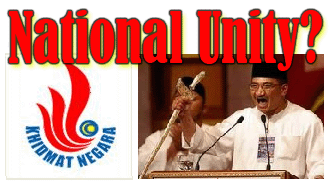
This year is a the 50th Merdeka Anniversary for the nation.
There are two ways to celebrate the half-century of nationhood – in a lavish expenditure of public funds in fireworks, extravaganzas and pageantry or to celebrate it in a meaningful manner to instill greater national solidarity and sense of purpose in the nation’s journey to achieve a Bangsa Malaysia and a fully developed nation status.
Parliament, as the highest political forum in the land, should set the national example to celebrate the half-century of our nationhood in a meaningful manner, with Malaysians regardless of race, religion, class or political beliefs standing up for fair, just and progressive nation-building policies to create towering Malaysians and to stop Malaysia’s loss of international competitiveness.
The most meaningful way to celebrate the country’s half-century of nationhood is to seek a national consensus as to what had gone wrong with nation-building and how we can learn from the mistakes and failures of the past decades so that we can be more successful in the next 50 years, in particular on the following issues:
Firstly, National unity — why after nearly five decades of nationhood, race relations in Malaysia is “not good, fragile and brittle”, as publicly admitted by the Prime Minister recently. Racial and religious polarization have never been more serious today than in the past five decades.
The introduction of the national service training programme in 2004 is testimony of the failure of the national education system to create national unity in the country — and this is no surprise when the Education Minister, Datuk Seri Hishamuddin Hussein is the very symbol and cause of such polarization with his racist keris-wielding histrionics at Umno general assemblies. Read the rest of this entry »
Trend of greater official secrecy under Pak Lah government
Posted by Kit in Good Governance, Parliament on Thursday, 22 March 2007
The third front where I had hoped would be special mention of new policy initiatives in the Royal Address is in connection with Abdullah’s pledge to lead an open, accountable and transparent administration — in particular a firm government commitment to introduce a Freedom of Information Act to replace the Official Secrets Act (OSA) and the removal of the OSA and declassification of all privatization contracts, whether toll contracts, power and water concessions, to put them in the public domain for the scrutiny of the Malaysian public.
The Works Minister, Datuk Seri S. Samy Vellu was recently very incensed and hurt. He appeared on the front page of New Sunday Times (Feb. 25, 2007) with blaring headlines: “‘Works Minister, still smarting over being accused of ‘going for blood’, says… ‘I’m no Dracula'”.
Samy Vellu accused me of calling him a Dracula.
He said: “Lim Kit Siang said I was going for blood. He was indirectly saying I’m a Dracula. Only a Dracula goes for blood. A man and politician of his age and experience should be more cultured when he talks about other people.”
I said he was “bloodthirsty” and I stand by what I said. But I never said he is Dracula. If he is a Dracula, then it is his own self-description!
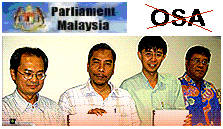
Let me state in this House that “Dracula” had never entered my mind when in my statement of 3rd February I had demanded to know why Samy Vellu was “suddenly so ‘bloodthirsty’ as to want four Opposition leaders, namely Tan Sri Khalid Ibrahim and Tian Chua of PKR, Ronnie Liu of DAP and Dr. Hatta Ramli (PAS) jailed for at least a year under the Official Secrets Act (OSA) for revealing that the government had guaranteed profits to Litrak in the Lebuhraya Damansara-Puchong (LDP) concession agreement?” Read the rest of this entry »
40 months as PM – Malaysians even more unsafe from crime
Posted by Kit in Parliament, Police on Thursday, 22 March 2007
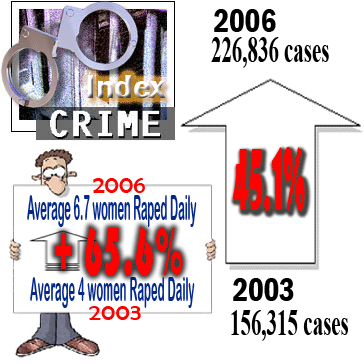
The second front where I had hoped there new policy initiatives would be announced in the Royal Address is on police reform and in particular to establish the Independent Police Complaints and Misconduct Commission (IPCMC) with the announcement that the bill for its formation would be taken through all three readings in the current meeting of Parliament in view of the worsening crime index as well as repeated blows to public confidence in the ability of the police to implement the 125 recommendations of the Royal Police Commission to become an efficient, incorruptible, professional world-class police service to combat crime, uphold law and order and respect human rights.
The crime index in the country has worsened from 156,315 cases in 2003 to 226,836 cases in 2006 — a sharp rise of 45.1% in the past three years when the police force had set the target of reducing the crime index by five per cent each year!
In the past three years, violent crime had skyrocketed by 85.8 per cent from 22,790 cases in 2003 to 42,343 cases in 2006, with rape cases registering the highest increase of 65.5 per cent — reaching an average of 6.7 women raped daily in 2006 compared to an average of four women raped daily in 2003. In 2003, an average of 1.5 persons were murdered daily; but in 2006, this has increased to an average of 1.65 persons murdered daily.
I want to remind the Prime Minister of his pledge 40 months ago that one of his top priorities would be to reduce crime to restore to Malaysians their fundamental right to be free from crime and the fear of crime, whether in the streets, public places or the privacy of their homes? Today, Malaysians feel even more unsafe from crime than when he became Prime Minister.
Abdullah had been the Minister in charge of police for the past seven years and it is time he take full personal responsibility for the worsening crime situation in the country by providing personal leadership in the campaign to reduce crime — starting by ending all the procrastinations in the establishment of the IPCMC to create an efficient, incorruptible, professional and world-class Police Service. Read the rest of this entry »
Royal Commission of Inquiry on Corruption and ACA
Posted by Kit in Corruption, Parliament on Thursday, 22 March 2007
Some 40 months after Abdullah’s pledge to “walk the talk” to eradicate corruption, Malaysia is faced with the worst crisis of national integrity in the 40-year history of the Anti-Corruption Agency and 50-year history of the nation, with a spate of corruption scandals in the past two weeks, viz:
- Serious corruption allegations against the Anti-Corruption Agency director-general Datuk Zulkipli Mat Noor;
- Serious corruption allegations against the Deputy Internal Security Minister, Datuk Mohd Johari Baharun; in the Emergency Ordinance (EO) “freedom for sale” scandal; and
- Serious allegation by the Chief Justice, Tun Ahmad Fairuz Sheikh Abdul Halim of judges who accept bribes.
Internationally, Malaysia’s anti-corruption perception had been on a downward spiral ever since Abdullah’s takeover as Prime Minister.
Only last week, there was more bad news for Malaysia and Abdullah’s 40-month premiership.
The Hong Kong-based Political and Economic Risk Consultancy (PERC) 2007 corruption table in Asia, which is released every year based on a poll of expatriates working in Asia on their perceptions on corruption, is bad and grim news for all Malaysians concerned about national integrity, good governance and international competitiveness.
In a grading system with zero as the best possible score and 10 as the worst, Malaysia was ranked sixth in Asia with a score of 6.25 by PERC Corruption Asia 2007.
In 1996, Malaysia was ranked No. 4 with a score of 5, a reflection of the relentless deterioration of the corruption problem in the country over the years.
As the PERC annual corruption ranking is one of the polls used by Transparency International (TI) for its annual Corruption Perception Index (CPI), this is very bad news as the PERC 2007 Corruption Table is a forewarning that Malaysia is heading south towards No. 50 placing in TI CPI 2007 on the occasion of Malaysia’s 50th Merdeka anniversary this year. Read the rest of this entry »
Neither new policy initiative nor legislative programe for the new year
Posted by Kit in Corruption, Parliament on Thursday, 22 March 2007
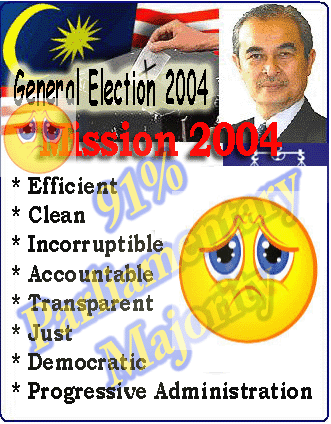
As the third annual policy speech of the Abdullah premiership, the Royal Address is a disappointment as it offered neither new policy initiatives nor any legislative programme for the delivery of the Prime Minister’s pledges of an efficient, clean, incorruptible, accountable, transparent, just, democratic and progressive administration which is overdue by 40 months.
Last week, I had publicly urged the Prime Minister to come personally to Parliament on Question Time yesterday to answer the question asking him “to give a progress report on his reform pledges in the past 40 months, highlighting the reasons for the failures/shortfalls and how he could assure Malaysians disappointed that he had failed to ‘walk the talk’ on his reform agenda”.
This is because of the widespread and deep disappointments among Malaysians at the failure of the Prime Minister to live up to the high hopes of Malaysians to “walk the talk” to honour the pledges of reform agenda he had made when coming into office.
This question was “personal to holder” and could only be answered by the Prime Minister himself, as it concerns the pledges he had made when he became Prime Minister and during the 2004 general election for which he won an unprecedented 91% parliamentary majority. It could not be delegated to another Cabinet Minister, whether the Minister in the Prime Minister’s Department, Datuk Nazri Aziz or even the Deputy Prime Minister, Datuk Seri Najib Razak.
But this was not to be. Although Abdullah urged Barisan Nasional Backbenchers Club (BNBBC) members on Monday to perform “something extraordinary” to bring back the glory days of parliamentarians in line with the country’s 50th anniversary celebrations this year, no return of such “glory days” is conceivable firstly, when the Barisan Nasional has a suffocating 91% parliamentary majority and secondly, the Prime Minister stays away from Parliament even on questions directed at him personally.
I believe that the four previous Prime Ministers, from Tunku Abdul Rahman, Tun Razak, Tun Hussein Onn and Tun Dr. Mahathir Mohamad would not have stayed away from Parliament and delegated away the answer to such a “personal to holder” question.
The Prime Minister’s absence is most telling — for it is as good as an admission that he has very little to show to Parliament and the nation about honouring his reform pledges and agenda in the past 40 months — or he would not have allowed any other Minister to answer the question. Read the rest of this entry »
Abdullah govt’s anti-blog and anti-Internet Portals mindset/culture
Posted by Kit in IT, Parliament on Thursday, 22 March 2007

I know I am going against the grain of government thinking in asking Parliament to give serious attention to blogs by Malaysians, especially when the Internal Security Ministry has just warned the mainstream newspapers in the country against quoting and publishing “anti-government articles” from online portals and blogs.
The clarification by the Internal Security Ministry’s Publications Control and Al-Quran Texts Unit senior officer Che Din Yusof who sent out the warning to mainstream newspapers that his letter was a “request” and not a “directive” does not wash, when newspapers were also reminded that condition 11 of their publishing permit required them to “follow and not act against” such directives issued by the ministry.
Che Din has said that the Internal Security Ministry does not want the newspapers to get the people to believe everything that comes from blogs and the Internet portals.
Is it the business of the Internal Security Ministry to get the people to believe mainstream media and disbelieve blogs and Internet portals? Isn’t this a violation of the Bill of Guarantees proclaimed to the world by the Malaysian Government when launching the Multi-Media Super Corridor in 1996 — in trying to influence the mainstream media and the people at large to disbelieve blogs and Internet portals?
In fact, isn’t the government turning its back to the knowledge-based economy and the information and communication technology in adopting such an anti-blog and anti-Internet portals mindset and culture? Read the rest of this entry »
Who is more unpatriotic, disloyal and anti-national?
Posted by Kit in Parliament on Wednesday, 21 March 2007

I am very concerned that in Paragraph 15 of the Royal Address, the government regards “excellence” as a goal to be achieved in 13 years’ time in 2020, when it should have been a constant and unbroken standard of both public and private service from Independence half-a-century ago.
The most meaningful way for the nation to celebrate our 50th Merdeka Anniversary is for the government to end the denial complex and recognise that driving over a million talented, creative and enterprising Malaysians from our shores in the past four decades because of discriminatory policies is one of our greatest nation-building failures and to summon a national resolve to end the root causes of such continuing brain drain.
Let no one stand up to say that the over a million talented, creative and enterprising Malaysians who had been driven from our shores in the past four decades because of discriminatory policies are unpatriotic, disloyal and anti-national, for if such an argument is to be accepted, then those who had been responsible for the discriminatory policies which caused such a costly brain drain to the country would be even more unpatriotic, disloyal and anti-national.
This brain drain problem must be given utmost importance and priority to stem a new exodus of emigration of Malaysian talents, both Malay and non-Malay. Read the rest of this entry »
Million-Malaysian brain-drain – a national disaster
Posted by Kit in Parliament on Wednesday, 21 March 2007
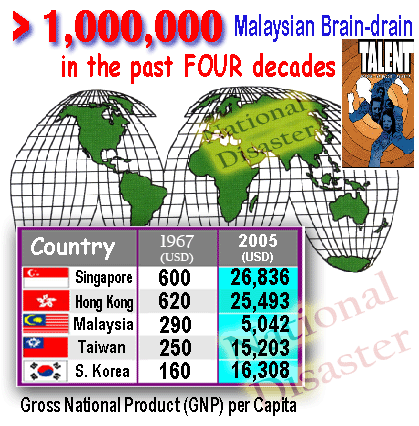
I have quoted extensively because the brain drain in the past four decades of over a million talented, creative and enterprising people — although there are those who would say it is double this figure — must be regarded as a national disaster and not just a personal or family tragedy.
The world has moved into the knowledge economy where the foundation of a nation’s power are more likely to rest on brains rather than brawn, on the creativity, energy and talent of its people rather than on the size of its population and the extent of its territory.
I submit that it is the brain drain of Malaysia’s precious human capital in the past four decades which had been the principal reason why the nation had failed to achieve the full potential of our excellent economic advantages and rich resource endowments at Independence. Read the rest of this entry »
More blog wisdom on Malaysian diaspora for MPs
Posted by Kit in Parliament on Wednesday, 21 March 2007
Po Kuan’s blog also evoked responses about real life trials and tribulations such as the posting by Taja Enjok:
I know Mr. A for the past 9 years. He was a clerk and his wife is a general worker. They have 2 sons. It was around that time their eldest son failed to make it into any of the IPTA. His eldest son decided to join a private college for a twinning programme. Meanwhile he worked part-time to finance his studies. Then came the final year. Both father and son couldn’t save enough for the overseas fees and expenses. The father remembers what he learned during his school days.
? ? ? ? ? ?
? ? ? ? ? ?
Others give son chest full of gold.
I teach son only one classic.Classic given a modern interpretation:
People give their children wealth.
I can only afford to give them education.Mr. A went for optional retirement. This enabled him to obtain his gratuity and thus finance the eldest son’s final year. As he is still strong, he took up part-time job to support his younger son’s secondary education. Fortunately the younger son got a place in the IPTA. Otherwise it could have been his wife’s turn to make the sacrifice.
And this posting from K.S.Ong:
Malaysia’s loss is US’s gain. Not many people have the stamina to struggle against an entrenched system of discrimination. Yet, I believe there are growing number of people, especially young citizens of all races who are growing weary of our racially based political parties and the discrimination in the name of helping the majority race. Read the rest of this entry »
Blogs on Malaysian diaspora raised in Parliament
Posted by Kit in Parliament on Wednesday, 21 March 2007
The second comment, by firstMalaysian:
My son left the country to pursue his Bachelors degree in BioMedical Engineering and is currently doing his PhD in a foreign land, without any scholarship or any recognition from his own homeland. He was given every assistance and opportunity from a foreign university to pursue his PhD and he is in the midst of a breakthrough in his research. Certainly, a Malaysian born scientist in the making and his students and professors in the foreign land called him a Malaysian and he is proud to be one but whenever he steps down at KLIA, he felt the difference, he is a second class Malaysian. There is an identity crisis back home.
In the foreign land, he has helped many Malaysians irrespective of ethnic background to excel and he loved to see Malaysians excel, whether Chinese, Indians or Malays. He was Malaysian first in a foreign land but in Malaysia, it is ethnic origin first.
This brain drain will continue
Another comment, Cool Man:
Reports of ethnic-minority students with near-perfect STPM results not getting a place at the local university have become the norm, and yet objections are often ignored – the government claims that it is a fair game for all.
Personally, I had no choice but to go overseas to study, and my parents had to spend their entire pension savings on financing my undergraduate degree in Australia. After graduation, most of my Malaysian classmates chose to either stay in Australia or work in Singapore, where equal opportunities and fair competitions give them better job prospects.
Before coming to the London I did my masters degree in Singapore, where I met many Chinese Malaysians in this situation. Most of us would like to return to Malaysia, but we know that research prospects for minorities are limited. No matter how talented we are, it seems we still have to travel outside our country to seek opportunities.
Blogs – must reading for MPs
Posted by Kit in Parliament on Wednesday, 21 March 2007
I fully agree with the Royal Address that national unity is the most important issue for our country. Whether the country has succeeded in forging greater unity among the diverse races, languages, religions and cultures in Malaysia should in fact be the primary yardstick in the assessment of the success or failure of half-a-century of nation-building and nationhood.

Fong Po Kuan, DAP MP for Batu Gajah, has a blog she named “Chamber of Thoughts”. Her latest entry is a three-part blog, “My Friend, An American Now”. It is a heart-rending story in the continuing creation of a Malaysian diaspora which has happened to more than a million Malaysians in the past four decades — whether to uproot and migrate overseas and later to take up foreign citizenship.
Although human migration is a common phenomenon in human history and prehistory, the migration of over a million Malaysians in the past four decades was more because of push rather than pull-factors, with the country losing many of her best talents and human resources stunting and undermining Malaysia’s achievement of her full potential in national development and international competitiveness.
Malaysia on her 50th anniversary would have been a more developed and more competitive nation if more than a million of the most talented , enterprising and resourceful Malaysians had not been driven away from our shores in the past four decades because of unfair discriminatory nation-building policies and measures by myopic politicians.
After nearly four decades of such self-inflicted injuries, the heart-rending story which Po Kuan blogs should have come to an end with the abandonment of unfair discriminatory policies among Malaysians.
But this is not the case. It would appear that the “Good Riddance to Bad Rubbish” reflex and mentality to the problem of emigration of Malaysians, though not publicly stated as in the seventies and eighties, is still quite prevalent today.
There is not much that can be done about the pull-factors of human migration but a government which refuses to address the problem of the push factors, which are the result of the failures of just and good governance, cannot claim to be a good government.
Po Kuan’s three-part blog should be a must reading for all MPs. Her blog, and my blog on Sunday which had drawn attention to the heart-rending account “My Friend, An American Now”, elicited many responses articulating the pain, agony and tribulation which had driven over a million talented, creative and enterprising Malaysians away from our shores only to benefit other countries. Read the rest of this entry »
Royal Address and Cabinet ignorance
Posted by Kit in Parliament on Wednesday, 21 March 2007
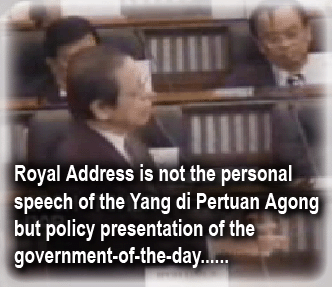
I rise to express appreciation of the Yang di Pertuan Agong for his maiden Royal Address to the joint session of both Houses of Parliament yesterday.
In keeping with the conventions of the Malaysian constitution and constitutional monarchy, the Royal Address is not the personal speech of the Yang di Pertuan Agong but the policy presentation of the government-of-the-day for the next 12 months — and this is illustrated by the formal presentation of the government policy speech by the Prime Minister to the Yang di Pertuan Agong before the delivery of the Royal Address.
This is why an amendment to the Motion of Thanks for the Royal Address — which is very common and frequent in other Commonwealth Parliaments whether in the United Kingdom, Australia or India – is not a personal slight or attack on the person or office of Yang di Pertuan Agong but a proposal of amendment to the government’s policy presentation contained in the Royal Address.
This is also why two days have been set aside in the 10-day debate for Ministers in the winding-up stage to defend the different aspects of the government policy presentation contained in the Royal Address.
As the Royal Address is the government’s policy speech for the coming year, it is most extraordinary for Cabinet Ministers to be indulging in self-praise and self-flattery in giving glowing tribute to the Royal Address after its delivery, as if Cabinet Ministers are ignorant about the constitutional convention of the Royal Address being the government policy presentation for the year.
Read the rest of this entry »
Should I continue to serve on PSCI?
Posted by Kit in Corruption, Parliament on Wednesday, 21 March 2007
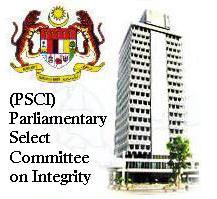
The Sun’s front page headlined it: “On/off/on/off — INTEGRITY PANEL SHIES AWAY FROM GRAFT INQUIRY” while Malaysiakini’s heading for its report yesterday was “Committee cancels ‘ACA hearing’ again” with the following story:
The Parliamentary Select Committee on Integrity today voted to call off a hearing involving Anti-Corruption Agency (ACA) director-general Zulkipli Mat Noor and whistleblower Mohamad Ramli Manan.
Explaining the decision, committee chairperson Bernard Dompok told reporters after a 40-minute meeting with committee members that it was due to “new circumstances” surrounding the issue.
The 12-member committee, by a majority vote, decided not to hear Zulkipli and Ramli for the time being until the pending court cases are disposed of.
Ramli recently filed a suit against several relevant parties for back payments of his wages and pension.
Dompok said the committee also took into consideration the issue raised by lawyer Muhammad Shafee Abdullah, who is representing former land and cooperative minister Kasitah Gaddam.
“The committee also took into account the concerns raised by the defence counsel for Kasitah Gaddam where the said counsel is contemplating citing Ramli for contempt,” he added.
Last week, Shafee told the Kuala Lumur High Court that the statements made by Ramli, who is the former ACA Sabah director, in his exclusive interview with malaysiakini could potentially prejudice his client’s corruption trial.
Last Monday, the committee had deliberated on the matter and the majority of its members were of the view that the hearing would not be considered subjudice. Read the rest of this entry »
RM9 billion double-tracking project – penny-wise and pound-foolish
RM9 BIL DOUBLE-TRACKING PROJECT — PENNY WISE POUND FOOLISH
Z. IBRAHIM
Klang
I refer to the report stating that the Government now intends to go ahead with the RM9 billion double-track electrified railway which it earlier shelved 3 years ago. That this project is being revived so close to the elections only seems to increase rumors that the ruling party needs the money for the elections in the form of kickbacks. The project itself is poorly thought through.
KTM since British colonial times has been running services on meter-gauge tracks. Meter gauge tracks were basically designed at least during those days for industrial use and in Malaysia’s case — to transport tin.
However we failed to modernize and completely neglected our rail services in favour of road transport and continued using these meter gauges even for our passenger services.
In most parts of the world passenger services started running on standard or broad gauge.
To achieve decent transit times between KL and Penang etc, double tracking on a meter gauge will be slow and clearly will not be competitive.
Obviously this is a half measure as it seems the project is trying to avoid investing in rolling stock as would be the case if standard or broad gauge are adopted instead.
Simply put you cannot run a train fast if your tracks are not broad enough for stability at high speeds. For you to achieve speed and stability you need standard or broad gauge. Read the rest of this entry »
Class of “forgotten Malaysians”
Hi Kit Siang
I’m not sure if you’ll be reading this, or even why exactly I’m writing to you; but like other times after reading about the happenings in Malaysia through your blog, I am saddened and moved from deep within.
Allow me to introduce myself. I was born in Johor, in 1983 – making me 24 years of age this year. From a young age, from primary (or standard one) I studied in Singapore. Instantly, this placed me into a group of ‘forgotten Malaysians’ of which I still belong to today – do read on. I did not study in Singapore by choice, my parents decided to see put me there when I was 7, because being part of the Malaysia school system when the British system was employed -they were alarmed by the perceived drops in the levels of education in Malaysia at that time – and they really wanted me to grow up speaking good English…and Singapore was the closest country to have its curriculum in English at that time. I’m sure you can appreciate the incredible irony in Malaysia reversing on its decision years ago and teaching Math and Science in English now. And while I am most capable of invoking my own commentary and discourse on the subject and others like it, I shall resist the urge and refrain from doing so on this occasion, as I nevertheless will find myself doing throughout the rest of this email – as each instance of the incredulous policies and politicians that dominate our country come up.
But I digress. I studied in Singapore a full ten years, travelling DAILY from Johor Bahru, not residing in Singapore because, I guess, my parents wanted me to retain my unique Malaysian identity and “Malaysianess”. I do not have fond memories of my time in the country, although I did well at school, I guess, I dislike autocratic and freedom-curbing societies where the rights of the individual are sacrificed for the whims of the elected collective in the name of nation-building. That is not to say I do not understand the need for such measures at certain times – but I suppose I do not function well in countries where such practices are the norm.
At the end of my high school studies in Singapore, I made the decision to return to Malaysia. To study at a private college in KL. I had tried on past occasions when I was in high school, to do so, only to find out that I was not eligible to do so because I did not take Bahasa Melayu as my primary subject. As a result of studies in Singapore, where English was the medium of instruction and Mandarin was my ‘mother tongue’, I cannot speak fluent Malay to this day nor do I have the ability to write in it. Therefore, according to some quarters, I am not considered Malaysian. But was I to blame? I remained in KL a full 3 years, was one of the top students at my college for a worldwide course, until it was time for me to pursue my education overseas. Read the rest of this entry »
